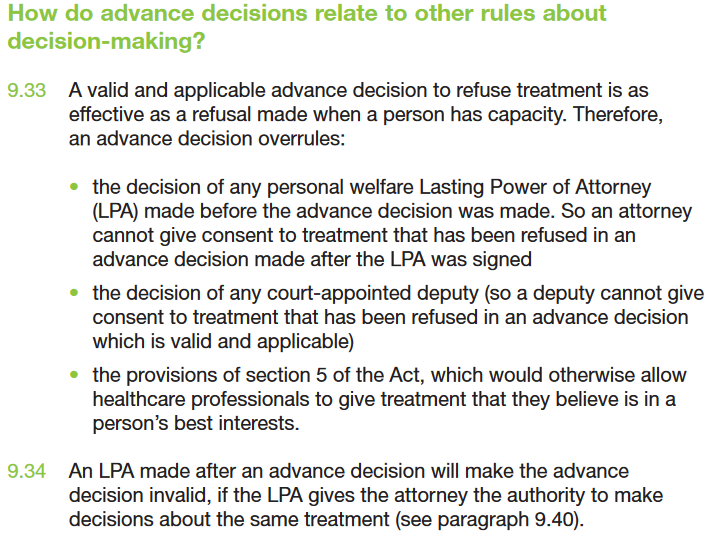What difference does it make if an Advance Decision to Refuse Treatment is written before or after a Lasting Power of Attorney?
This week’s blog answers another question I have been asked recently - What difference does it make if an Advance Decision to Refuse Treatment is written before or after a Lasting Power of Attorney?
Background
The question is one I have been asked many times in the past and again more recently – whether to write an Advance Decision to Refuse Treatment before or after creating a Lasting Power of Attorney. The question also links with my previous blog Can a family create an Advance Decision to Refuse Treatment for someone who has lost capacity?
I will outline the terminology before answering the question, it’s always great to re-cap and from setting out the framework the answer becomes clearer. I’ll explain what a Lasting Power of Attorney is, followed by an Advance Decision to Refuse Treatment; I’ll pause then – take a moment to see if you answer the question before reading on. In the last section I will answer the question “Should an Advance Decision to Refuse Treatment be written before or after a Lasting Power of Attorney?”
What is a Lasting Power of Attorney?
A Lasting Power of Attorney is a legal document that lets you appoint one or more people to make decisions on your behalf. This gives you more control over what happens to you if you have a sudden accident or an illness and cannot make your own decisions.
There are two different kinds of Lasting Power of Attorney, one for Health and Welfare and one for Property and Finance. A Health and Welfare LPA would be used if you lost capacity to make decisions about issues relating to health (e.g. whether you should have surgery or other medical treatments). When creating a Lasting Power of Attorney for Health and Welfare there is a section to give or refuse consent for attorneys to make life sustaining treatment decisions.
A Property and Finance LPA is used for to appoint someone to make decisions about your money for things like paying bills, collecting pensions or selling your home and can take effect, with your consent, as soon as it is registered.
A Lasting Power of Attorney can only be made at a time when you have appropriate mental capacity. This means having the ability to use and understand information to decide and to communicate any decision made.
What is an Advance Decision to Refuse Treatment?
An Advance Decision to Refuse Treatment (ADRT) is a legal document which sets out specific treatments a person may wish to refuse in the future. To complete an ADRT a person must be over the age of 18 and have appropriate capacity. The document must be signed, witnessed and contain the statement “even if my life is at risk”. An ADRT identifies a specific treatment that a person wishes to refuse in a specific circumstance.
What you think the answer is?
I’ll return to the question now and ask you to pause for a second here and think what difference does it make if an Advance Decision to Refuse Treatment is written before or after a Lasting Power of Attorney? Does it make any difference at all?
Does it make if an Advance Decision to Refuse Treatment is written before or after a Lasting Power of Attorney?
The simple answer to this is yes, there are implications for the order in which the documents are created and it is important to be aware of them.
An Advance Decision to Refuse Treatment written after a Lasting Power of Attorney will over rule the Lasting Power of Attorney, an Advance Decision to Refuse Treatment written before a Lasting Power of Attorney can be over ruled by a Lasting Power of Attorney with authority for life-sustaining treatment.
The Mental Capacity Act Code of Practice provides a summary of how advance decisions relate to other rules about decision making.
What does this mean in practice?
Understanding of the order of priority is essential if you are thinking of creating both a Lasting Power of Attorney and an Advance Decision to Refuse Treatment. How many people I wonder are not aware that their Advance Decision to Refuse Treatment could be overruled by a Lasting Power of Attorney?
It is something to be aware of too if you are a healthcare professional, if a patient has both a Lasting Power of Attorney and an Advance Decision to Refuse Treatment the more recent document will take precedence.
If the blog has helped you or provided information and you would like to support my ongoing work, head to Buy me a coffee – thank you!
Do you need help drafting your Lasting Power of Attorney? Contact me to find out how I can help.



